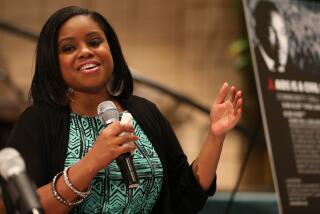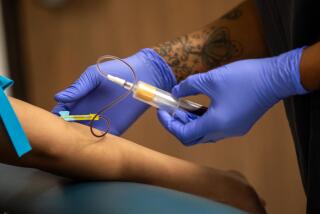Clinics Report Huge Increase in Requests for HIV Testing : * Health: In the wake of Magic Johnson’s recent announcement, one local facility reports four times as many people seeking to be tested for the virus that causes AIDS.
- Share via
Long Beach area clinics are reporting a dramatic surge in the number of requests for HIV antibody testing in the wake of Earvin (Magic) Johnson’s recent disclosure that he has tested positive for the virus that causes AIDS.
At The Center in Long Beach, the city’s primary HIV testing site, an average of 200 people a day are requesting testing--more than four times the 40 to 50 requests the facility was receiving before Johnson’s dramatic Nov. 8 announcement that ended his professional basketball career.
The Long Beach AIDS Network, which runs a telephone hot line, reports a 500% increase--from six to about 30--in the number of calls it receives each day requesting information on HIV testing.
At the Long Beach Health Department’s testing clinic on Pine Avenue, the daily number of drop-in patients requesting testing has tripled--from about 50 before Johnson’s announcement to more than 150 now.
“We’re real busy,” said Ruth Bundy, the department’s manager of preventive health services. “It’s nice that the message has finally gotten out that heterosexuals need to be concerned about the types of activities they engage in.”
The overflow has strained some of the facilities.
The Center is referring dozens of people requesting tests to other sites where they also may encounter roadblocks and delays, said Dr. Kelly Butler, the facility’s director of testing. “I don’t have the counselors or the space I need,” Butler said. “This is just going to blow us out of the water.”
To help handle the overflow, the city health department has added two new counselors to its permanent staff of three, Bundy said. In addition, she said, the department’s laboratory has extended the turnaround period for processing results from 10 to 14 days.
At the AIDS Network’s hot line, director Nancy H. Corby said the staff of counselors answering the telephones has been doubled from two to four. “People are worried,” Corby said. “People feel they might be at risk. I think that more people are aware that being heterosexual doesn’t protect you against HIV--that you have to take some protective steps.”
That concern seemed evident recently at the city health department’s HIV testing facility on Pine Avenue where a standing-room-only crowd waited to have blood drawn. Most of those waiting said they were heterosexual, and many were black.
“It’s been on the radio and TV so much that it scared me,” John Soto, 34, said of Johnson’s announcement. “I never thought that a guy like him could get infected. I want to get tested every year for the next 10 years.”
Abe White, a 25-year-old truck driver from Los Angeles, said he feared he might have been infected during a period of promiscuity before his recent marriage. “Magic Johnson kind of motivated me,” White said. “I could relate to how he contracted it; it put a lot on my mind, and I decided to get checked out.”
Johnson has said he contracted the virus through sex with women.
Howard Davis, a married construction worker from Compton, said that he also decided to schedule a test after the Laker star’s announcement. “Anybody can get it,” he said. “You don’t have to be gay.”
At a recent gathering of the Winners Circle, a local support group for heterosexuals who have AIDS or have tested positive for the HIV virus, participants said they hope that Magic Johnson’s story will help lessen the ostracism to which they have been subjected.
“The time is coming when (having the virus) won’t be so much of a stigma,” said one member, a 28-year-old loan officer diagnosed last year with AIDS. “It will be easier for people to come out and say they have the same problem that Magic does.”
Sitting next to him, his wife of three years, who has tested positive for the HIV virus but has not yet developed any symptoms of AIDS, nodded in agreement. “There shouldn’t be any stigma,” she said. “Knowing is not the end, it’s the beginning of taking control of your life.”
More to Read
Sign up for Essential California
The most important California stories and recommendations in your inbox every morning.
You may occasionally receive promotional content from the Los Angeles Times.













